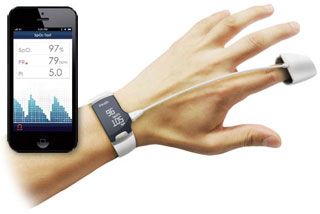 Over the past decade and beyond, technology has increasingly become part of our lives, gaining functions as its form factor has shrunk in size. Until recently, however, the focus has been on helping us get a clearer view of the world “out there”. Constantly evolving technology has allowed individuals to research, learn, stay-up-to-date and communicate in new and ever-deeper ways – but will the next frontier be within ourselves? Technology is poised to start looking in, rather than helping us to look out. The latest tech trends help us to monitor ourselves.
Over the past decade and beyond, technology has increasingly become part of our lives, gaining functions as its form factor has shrunk in size. Until recently, however, the focus has been on helping us get a clearer view of the world “out there”. Constantly evolving technology has allowed individuals to research, learn, stay-up-to-date and communicate in new and ever-deeper ways – but will the next frontier be within ourselves? Technology is poised to start looking in, rather than helping us to look out. The latest tech trends help us to monitor ourselves.
Just what can wearable tech track?
There are smartphone apps and sensors that can sense, sync, transmit and store personal analytics such as vital signs, fitness and much more. Smartphones can track your body temperature, pulse, calories burned, exercise intensity, hydration, respiratory rate, sleep habits and fitness levels, monitor chronic diseases, track improvement, provide medication management and reminders – and more.
Biosensors included in personal portable devices and smartphones include: accelerometers (movement monitors used to measure the intensity of physical activity, steps taken, calories burned), thermometers, heart-rate/pulse monitors, magnetometers, gyroscopes and more. Some smartphones can interact with Bluetooth enabled glucose meters and blood pressure monitors.
For ease of analysis and use, the biometrics collected can typically be arrayed on your personal health data dashboard. Information can be visualised in different forms, for instance as a list or graph. The apps can also share this information with your doctor.
Health and medical advice gets personal – and easily manageable
All this vital sign data could be just what we need to maintain and improve our health. This technology can help the ever-busier and more distracted multi-taskers of today to focus on themselves – and more specifically, on their health. We all know that managing stress, keeping the BP low and eating healthy are good for us, but often we don’t apply that knowledge. It’s too theoretical, perhaps—and all the good healthcare advice can be put, all to easily, out of sight and out of mind. It’s also hard to keep all the rules straight as to how many carbs per day, etc.
Never fear, new technological gadgets are here to help us put sage health advice to practical, personal use in daily life. The key is likely in the personalization – new wearable smart tech is showing us how the common healthcare truisms apply to each of us individually and personally. These wearables can monitor our inner workings in detail and tell us – and share with our medical professionals – very specifically, how each of our daily actions and choices affects our life and health. We’ll be able, on a consistent basis, to make better decisions about that next after-dinner drink or workplace doughnut.
Wearing your health on your sleeve: will smartphone health apps be popular?
Resistance is low to new smartphone health technology, although some had predicted public reluctance to use mobile health “m-health” solutions. McKinsey research shows that members of all age groups welcome mobile healthcare devices and services and digital monitoring. They predict that three-quarters of patients will use digital health services in the future, for everything from sharing records with and among doctors to online appointments and consultation–and well beyond. No wonder major business/market players are getting into the act.
And it’s working health-wise and money-wise: The British Journal of General Practice recently found that a smartphone app “significantly increased physical activity over 8 weeks in a primary care population” and sustained the increase throughout the trial. This result, they noted, shows that the app solution could effectively – and in a highly generalisable way – help eliminate “major, potentially modifiable, risk factor[s] for cardiovascular disease, cancer, and other chronic diseases”. Mobile phone disease management, care coordination and other “m-health” innovations could save “€99bn in the EU in 2017 and add €93bn to the GDP,” noted Paul Solman in the Financial Times.
Opening up medical research silos: gathering big data to speed development
Until now, data hoarding has slowed the development of new medicines and treatments. Medical research institutions, drug companies and others – who fear enabling competition for business, research grants or recognition – have kept valuable health data to themselves. Aggregating anonymised smartphone-gathered vitals could create a valuable pool of public data enabling medical experts to collaborate on solutions to major diseases and crippling public health challenges.
Wearable tech for prevention can trump a pound of cure
Today’s new-borns are likely to grow up with up-to-the-moment, real-time personal health data, which should help prevent much of the lifestyle and habit-related disease, like obesity, that we see today. This generation will be made aware of potential problems before bad habits become ingrained.
Wearable tech seems ready to improve daily lives and longevity in the very near future. There’s considerable promise, even for those of us (perhaps) riddled with bad habits. If you think you can’t afford a personal trainer or a physician in your entourage for moment-to-moment motivation – now you can. Will a glance at your smartwatch, for information and motivation, keep you on the path to good health? Companies like Samsung, Apple and Google are banking on it!



